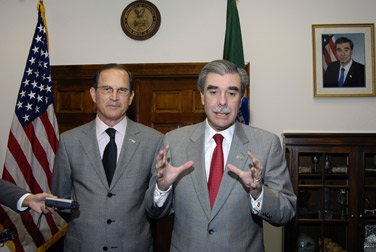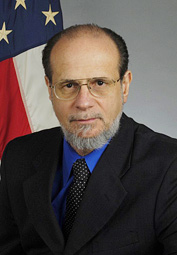|
|
|
||||||||||
|
Short Takes: News from the International Trade Administration
Second Meeting of the U.S.–Brazil Commercial Dialogue Held in Washington, D.C. On November 7, 2006, Secretary of Commerce Carlos M. Gutierrez hosted Luiz Furlan, Brazilian minister of development, industry, and trade, for a second meeting of the U.S.–Brazil Commercial Dialogue in Washington, D.C. At the meeting, Gutierrez and Furlan pledged to continue working to improve bilateral economic and business relations and to encourage the public and private sectors of their respective countries to increase and diversify the bilateral flow of goods and services. The two officials made note of the concrete steps taken since the June 2006 launch of the dialogue. These steps will lead to stronger U.S.–Brazil commercial ties, will promote innovation, and will enhance commercial opportunities, particularly for small businesses. (Story continues below.)
Commitments made during the November meeting include greater technical cooperation on patents and trademarks, standards, conformity assessment, and technical regulations, as well as the development of best-practice initiatives on business registration and entrepreneurial development. The Department of Commerce and the Brazilian ministry also agreed to public- and private-sector events designed to highlight the competitive advantage of moving goods efficiently across borders and to support existing customs modernization initiatives, including express delivery services. Moreover, the two governments agreed to undertake cooperative trade show activities and programs that will focus on travel, tourism, and franchising. The Department of Commerce and the Brazilian ministry also decided to exchange information on methods used in the collection, classification, and distribution of statistical data on international trade in services. The next meeting of the U.S.–Brazil Commercial Dialogue is scheduled in Brazil in early 2007. Two-Day Forum to Focus on Free Enterprise and Investment in the Americas Secretary of Commerce Carlos M. Gutierrez announced on November 20, 2006, that the first Americas Competitiveness Forum will be held on June 11–12, 2007, in Atlanta, Georgia. Government ministers and leaders from the private sector and academia from each of the Western Hemisphere’s 33 countries will be invited to the forum to explore cutting-edge ideas and to highlight best practices to spark innovation, economic growth, and regional cooperation in the area of competitiveness. Growth in Latin America has been robust during the past several years. In 2004, foreign direct investment in Latin America was more than $54 billion, a 46 percent increase over 2003. The International Monetary Fund reports that Latin American economies grew, on average, 4.3 percent in 2005, fueled by demand for commodities. However, the World Bank’s 2007 Doing Business report found that most Latin American countries have been much slower than the rest of the emerging world to implement business-friendly reforms. Such reforms foster competitiveness, which is a driving factor in economic growth. "The Americas Competitiveness Forum is an excellent opportunity to work on policies and strategies that attract investment and promote free enterprise throughout the region at a time when we are facing ever-growing competition from Asia and elsewhere," said Gutierrez in announcing the two-day event. The Department of Commerce’s International Trade Administration, with support from other U.S. government agencies, is organizing the forum. Topics will include leveraging public–private partnerships to foster innovation, workforce development and education, and global supply-chain strategies. In addition, private-sector representatives from the region, non-governmental organizations, and universities will be invited to participate. The Atlanta forum is an outcome of a recommendation made by President George W. Bush after attending the Fourth Summit of the Americas—held November 2005 in Argentina—to meet with leaders to discuss improving the hemisphere's competitiveness. Information on the summit is posted on the Web at www.summit-americas.org. Questions regarding Americas Competitiveness Forum c an be directed to Alysia Wilson of the ITA’s Market Access and Compliance unit, tel.: (202) 482-5327; e-mail: alysia.wilson@mail.doc.gov. Commerce Official Elected Vice Chairman of OECD Steel Committee Joseph Spetrini, Import Administration deputy assistant secretary for policy and negotiations, has been elected a vice chairman of the Organization for Economic Cooperation and Development (OECD) Steel Committee. Spetrini, along with Alberto Canevali of the European Commission, were selected to assist OECD Steel Committee Chairman Risaburo Nezu of Japan at the group’s 61st meeting, which was held on November 7–8, 2006, in Paris, France. (Story continues below.)
The OECD Steel Committee, which features 30 full member nations and nine observer nations, accounts for more than 65 percent of world steel production and 80 percent of steel exports. The committee has emerged as the unique platform where multilateral steel problems can be discussed and political solutions to those issues can be considered. The November meeting allowed members to follow up on issues that remained outstanding from the unfinished negotiations on steel subsidy disciplines that were conducted under the OECD’s High Level Process on Steel. Topics of discussion included steel-related environmental issues and policies (including programs and technologies aimed at reducing greenhouse gas emissions), global steel market developments, and the current situation for steel-making raw materials, such as iron ore, scrap, and coke. The OECD Steel Committee also discussed the possible development of member surveys on steel-making capacity and trade-distorting steel policies, as well as improvements to the statistical information collected by the committee. The three North American Free Trade Agreement (NAFTA) governments issued a joint statement on the direction of future committee work and a summary of the foreign market development monitoring reports prepared by the North American Steel Trade Committee, which show that significant government support for global steel-making capacity continues. The next meeting of the OECD Steel Committee is tentatively scheduled for May 2007 in Istanbul, Turkey. U.S.–EU Ministerial Meeting Brings Progress on Intellectual Property Rights and Regulatory Issues The Commerce Department hosted the second informal U.S.–European Union (EU) economic ministerial meeting on November 9, 2006, in Washington, D.C. The meeting brought together Commerce Secretary Carlos M. Gutierrez and Energy Secretary Samuel W. Bodman with European Union Commission Vice President Günter Verheugen and Finnish Minister for Trade and Industry Mauri Pekkarinen. They reviewed progress on a number of significant areas of concern for the transatlantic economy, including innovation, the protection of intellectual property rights (IPR), regulatory cooperation, and energy security. IPR protection was an issue of particular importance to the ministers. In June 2006, the U.S.–EU Summit in Vienna, Austria, adopted an action strategy for enforcing IPR. Since then, U.S. and EU experts have been working closely to protect IPR by improving border enforcement cooperation, by helping the private sector to enforce its rights, and by helping countries such as China and India fight counterfeiting and piracy. Gutierrez, Bodman, Verheugen, and Pekkarinen agreed at the meeting to strengthen efforts to remove regulatory barriers to trade and investment. An initial step will be exploring a limited number of projects in the automobile and health-related sectors, including collaboration on standards in emerging technologies. Other critical economic issues discussed by the ministers included the challenges of the global energy market and the Doha Development Agenda negotiations. They also welcomed the progress made under the Transatlantic Innovation Initiative, which Gutierrez and Verheugen had launched in November 2005, and they agreed to support innovation in areas such as health-related industries, nanotechnology, and automotive technology. This informal economic ministerial meeting fulfills commitments made at the 2005 and 2006 U.S.–EU Summits, which called for further transatlantic economic integration. The next U.S.–EU Summit is to take place in the first half of 2007.
|
|

